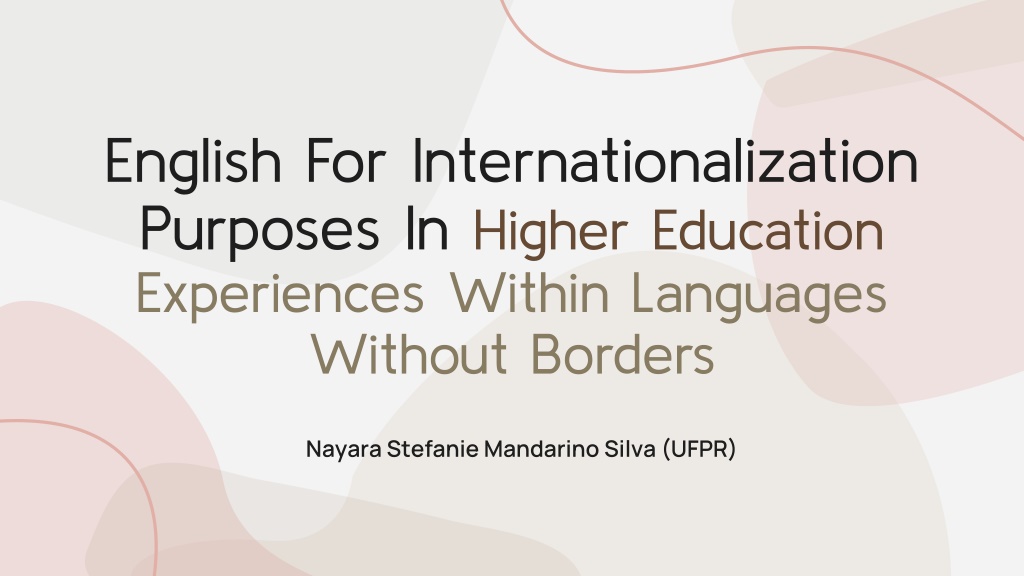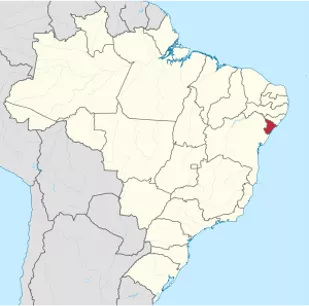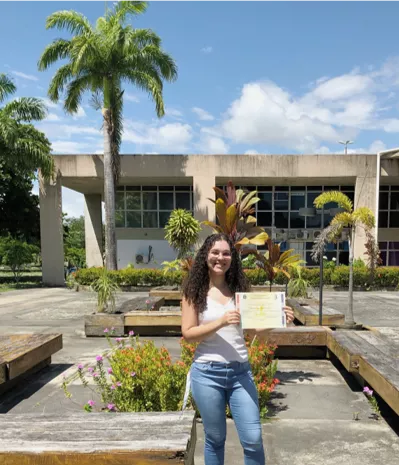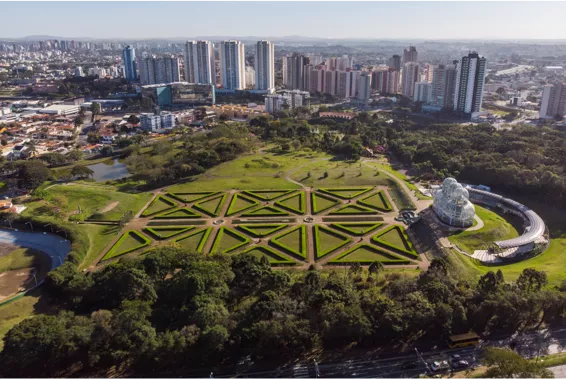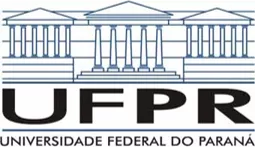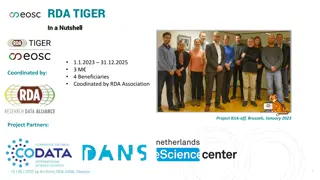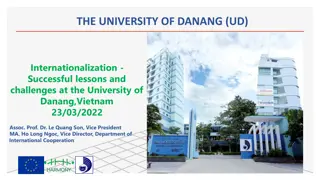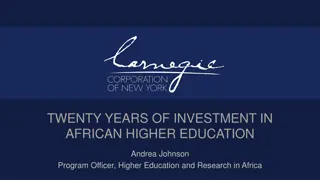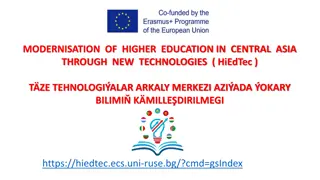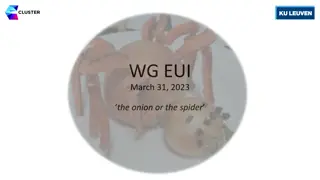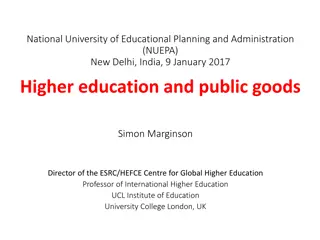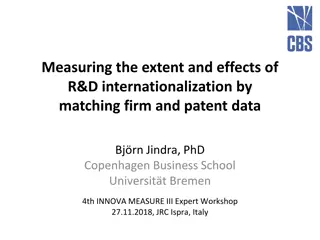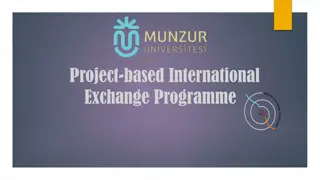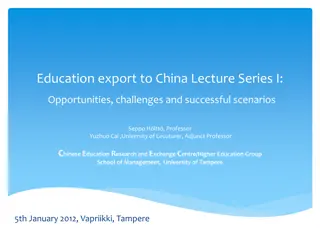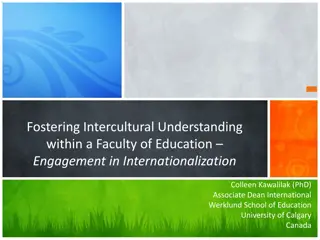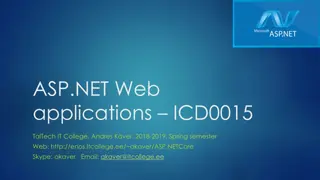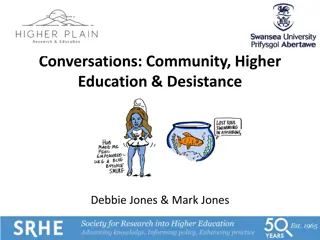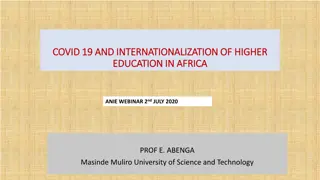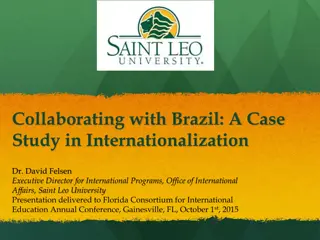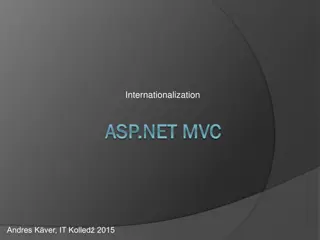English for Internationalization Purposes in Higher Education Experiences
Amid efforts towards decolonial options, analyzing English courses developed in 2019 in Brazil for critical internationalization. Autoethnographic methodology applied to study experiences and meanings. Data sourced from journals, teaching logs, and documents focused on oral production, language varieties, and academic communications. Addressing (de)coloniality in the context of colonialism and situated difference.
Download Presentation

Please find below an Image/Link to download the presentation.
The content on the website is provided AS IS for your information and personal use only. It may not be sold, licensed, or shared on other websites without obtaining consent from the author. Download presentation by click this link. If you encounter any issues during the download, it is possible that the publisher has removed the file from their server.
E N D
Presentation Transcript
English For Internationalization Purposes In Higher Education Experiences Within Languages Without Borders Nayara Stefanie Mandarino Silva (UFPR)
To start I n t er n atio n ali zatio n , glob ali zatio n and colo n i ali t y ( Kn i gh t , 1999 ; Qui j ano , 2002 ; Szy s z l o , 2016 ) Brazi l and i t s n atio n al p r og r a ms : CwB ( Brasi l , 2011 ) EwB/LwB/Andifes LwB n etwo r k ( Associa o , 2019 ; Brasi l , 2012 ; 201 4 ; 2016 )
Despite being imperfect, efforts towards decolonial options can teach us possibilities and help us exercise our imaginations, which might open space to a university otherwise (Escobar, 2007)
Objective I aim t o analyze t h r ee of t he Engl i s h cou r s es I d eveloped i n 2019 s o as t o u n d ers t and t he effo r t s t owards a cri t i cal i n t er n atio n ali zatio n cons i d er i n g how I d eli n ked f r om and r ep r oduc ed colo n i ali t y ( Migno l o , 2007 ) .
Methodology i n autoethnography I s t udy what I do , and t he m eani n g I b elieve my doings and sayi n gs have. [ ] I have direct a c c ess t o t he exper i ences , f eeli n gs and r eason i n g t hat f l oats t h r ough my mind. ( Er i ksso n , 2010 , p . 93 , my highl i gh t ) .
Data com es f r om j ou r n als , t ea ching l ogs and docum en t s ( PowerPoi n t p r esen t atio n s , handou t s etc.) . I analyze t h r ee cou r s es I d eveloped i n 2019 , n a m ely Oral p r oductio n : d eb ates ( 32h ) , Engl i s h l anguage v ariet i es ( 4 8h ) , and Oral p r oductio n : a c a d emic com municatio n s ( 32h ) .
On (de)coloniality Colo n i alism and colo n i ali t y ( Maldona do-To r r es , 2007 ) : a s i t uated difference The d arker s i d e of mod er n i t y ( Migno l o , 2011 ) La hybris d el pu n t o cero ( Cas t r o - G m ez , 2007 )
A journey towards self- reflection in course planning
Issue - Proposed questions - How has the internet impacted English use? How can tensions be created/intensified in this context? How have memes impacted English use both online and in person? How can tensions be created/intensified in this context? How do you make sense of what you hear/see/sense? What are the strategies you use to read given information in a different language variety? What is the relation between a variety and social position? Whose variety is usually valued? Whose is not? How are idiomatic expressions related to culture? Focus - Class 1 Class 2 The impact of internet in English use The impact of memes in English use online and in person Intelligibility English online Class 3 Memes Class 4 Mancunian (UK) Variety and social inequality Class 5 Cockney (UK) Idiomatic expressions and culture English learning in Brazil Idiomatic expressions Class 6 How is English present in Brazil, considering historical aspects? Who has access to English classes? And who does not? What are the impacts of the socioeconomic conjuncture in English learning? How do different people (from different countries) deal with the accents from Brazilian people? And how do we? What groups use slangs? How can slangs emerge? How is social reaction to slangs related to social position? How is one s language variety related to a sense of belonging? How are the tensions between an I and an Other built? How have Englishes changed over time? How are the changes related to socioeconomic matters? How are varieties related to power? How do conflicts in communication arise? What is it that makes a variety standard in relation to others? How does the country deal with the variety of cultures and linguistic varieties? What are the historical factors related to English in the country? How collective and individual are dealt with within the system and how is it related to inequality? How did English come to be so expressive in the US? Why is American English so spread? Why do people consider AAE inarticulate? Where does this reading come from? How are power and race related to the decision of what is the proper way to speak/write? What does speak like a native speaker mean? Who is this native Class 7 Brazilian English Slangs and social position Class 8 Slangs Issue - Proposed questions - How has the internet impacted English use? How can tensions be created/intensified in this context? How have memes impacted English use both online and in person? How can tensions be created/intensified in this context? How do you make sense of what you hear/see/sense? What are the strategies you use to read given information in a different language variety? What is the relation between a variety and social position? Whose variety is usually valued? Whose is not? How are idiomatic expressions related to culture? Focus - Class 1 Class 2 Class 9 The impact of internet in English use The impact of memes in English use online and in person Intelligibility Variety and difference Mexican and Colombian English English online Socioeconomic matters and historical changes English in a globalized world Class 10 Class 3 English from a historical perspective Review Memes Class 11 Class 4 Power and standardization Diversity in Canada Evaluation Class 12 Mancunian (UK) Class 13 Canadian English Variety and social inequality Class 5 Cockney (UK) Social inequality and capitalism Class 14 Idiomatic expressions and culture English learning in Brazil Idiomatic expressions Class 6 US English (Standard) How is English present in Brazil, considering historical aspects? Who has access to English classes? And who does not? What are the impacts of the socioeconomic conjuncture in English learning? How do different people (from different countries) deal with the accents from Brazilian people? And how do we? What groups use slangs? How can slangs emerge? How is social reaction to slangs related to social position? How is one s language variety related to a sense of belonging? How are the tensions between an I and an Other built? How have Englishes changed over time? How are the changes related to socioeconomic matters? How are varieties related to power? How do conflicts in communication arise? What is it that makes a variety standard in relation to others? How does the country deal with the variety of cultures and linguistic varieties? What are the historical factors related to English in the country? How collective and individual are dealt with within the system and how is it related to inequality? How did English come to be so expressive in the US? Why is American English so spread? Why do people consider AAE inarticulate? Where does this reading come from? How are power and race related to the decision of what is the proper way to speak/write? What does speak like a native speaker mean? Who is this native Class 7 Racism and the devaluation of varieties Class 15 African-American English (AAE) Brazilian English Native speakerism Australian English Class 16 Slangs and social position Class 8 Slangs Framework 2 - English language varieties Class 9 Variety and difference Mexican and Colombian English Socioeconomic matters and historical changes English in a globalized world Class 10 English from a historical perspective Review Class 11 Power and standardization Diversity in Canada Evaluation Class 12 Class 13 Canadian English Social inequality and capitalism Class 14 US English (Standard) Racism and the devaluation of varieties Class 15 African-American English (AAE) Native speakerism Australian English Class 16
Issue - Proposed questions - How is architecture related to historical and geopolitical matters? Focus - Class 1 Class 2 Relations between architecture and historical and geopolitical matters Digital technology, inequality and communication Introducing talks/ communications How is digital technology affecting how we interact and construct meaning? What are possible impacts of the (lack of) access to digital technology? What makes knowledge valid ? Who decides that? On what grounds? Class 3 Developing arguments Class 4 Is astrology valid? On the validity of knowledge The impacts of pesticides use Indirect speech How do pesticides affect the food we eat? How can they impact the environment? What are possible outcomes to this use in large scales? What are the motives to using certain sources of energy? How do these choices impact the environment? Class 5 Explaining (body of academic presentations) Class 6 The impacts of choosing/using sources of energy Images as texts to be read and problematized Connectors How do the choices related to taking and editing (angle, colors etc.) images position the readers? How can images reproduce prejudice? How to read against them? How can we express our identities? Can everyone express themselves freely in every context? Why (not)? Where does self-expression and social rules collide? What is art? Who gets to decide that? What pieces are usually considered art? What is not? Who are those considered artists? Who is not? How free are artists to express their viewpoints? Why? How did productivity come to be so required in society? Where does the pressure to be productive come from? Who benefits from it? Who does not? How is motivation dealt with in a world where productivity is required? - What is the difference between a scientific fact and an opinion? Can they be separated? What kind of content can be found in museums? Where does it come from? How is it acquired? How do we feel about the content in the museum? How do we feel about it outside of the museum? How do we feel about who produced it? How do healthcare systems work in different countries? How is it related to Class 7 Concluding Class 8 The barriers for expressing one s own identity Asking questions (to engage in academic discussions) Issue - Proposed questions - How is architecture related to historical and geopolitical matters? Focus - Class 1 Class 2 Relations between architecture and historical and geopolitical matters Digital technology, inequality and communication Introducing talks/ communications Class 9 Art and westernization Engaging in academic debates with conflicting ideas How is digital technology affecting how we interact and construct meaning? What are possible impacts of the (lack of) access to digital technology? What makes knowledge valid ? Who decides that? On what grounds? Class 3 Developing arguments Class 10 Capitalism, productivity, and motivation Review Class 4 Is astrology valid? On the validity of knowledge The impacts of pesticides use Indirect speech Class 11 - Evaluation How do pesticides affect the food we eat? How can they impact the environment? What are possible outcomes to this use in large scales? What are the motives to using certain sources of energy? How do these choices impact the environment? Class 5 Class 12 Explaining (body of academic presentations) Music: scientific fact or opinion? Discussing the scientific method and the positivist ideals Using future forms to organize an academic communication Class 6 Class 13 The impacts of choosing/using sources of energy Images as texts to be read and problematized Connectors Museums and the Other How do the choices related to taking and editing (angle, colors etc.) images position the readers? How can images reproduce prejudice? How to read against them? How can we express our identities? Can everyone express themselves freely in every context? Why (not)? Where does self-expression and social rules collide? What is art? Who gets to decide that? What pieces are usually considered art? What is not? Who are those considered artists? Who is not? How free are artists to express their viewpoints? Why? How did productivity come to be so required in society? Where does the pressure to be productive come from? Who benefits from it? Who does not? How is motivation dealt with in a world where productivity is required? - What is the difference between a scientific fact and an opinion? Can they be separated? What kind of content can be found in museums? Where does it come from? How is it acquired? How do we feel about the content in the museum? How do we feel about it outside of the museum? How do we feel about who produced it? How do healthcare systems work in different countries? How is it related to Class 7 Concluding (Lack of) access to healthcare Class 14 Getting ready for academic Class 8 Framework 3 - Oral production: academic communications The barriers for expressing one s own identity Asking questions (to engage in academic discussions) Class 9 Art and westernization Engaging in academic debates with conflicting ideas Class 10 Capitalism, productivity, and motivation Review Class 11 - Evaluation Class 12 Music: scientific fact or opinion? Discussing the scientific method and the positivist ideals Using future forms to organize an academic communication Class 13 Museums and the Other (Lack of) access to healthcare Class 14 Getting ready for academic
Relati v ely f i x ed con t en t . S t r uggles wi t h l i n eari t y . A pat t er n I f o l l ow i n m any classes : n o t i cing a p r oblem and t hi n ki n g a bou t how t o s o l v e i t . A journey towards self-reflection in course planning
whi l e d ecolo n i al [ ] cri t i ques and p r a ctices are u n d ers t ood t o b e usefu l f o r r ecogn i z i n g endur i n g colo n i al pat t er n s , aski n g diff i cul t ques t i o n s , and ges t u r i n g t oward o t her poss i bil i t i es , t o seek wi t hi n t hese t heo r i es a p r escrip t i v e ( r e)so l u t i o n wou l d b e t o r ou t e t hem b a c k i n t o t he s a m e s et of colo n i al en t i t l em en t s t hat t hey challenge (Stein, 2019, p. 1780).
two main aspects led me to seek foreseeability, linearity, and order: external structures and my own constraints, contradictions, and anxieties
Intelligibility Epis t emic bli n dness o r bli n dness t o d a mnatio n and i n t el l i gibil i t y ( ANDREOTTI , 2016 ; M ALDONADO-TORRES , 200 4 ) . Differen t l evels of open n ess and wi l l i n gness t o engage i n cri t i cal discuss i o n s : ques t i o n i n g n o t s t ati n g
Intelligibility Choices are also i n f o r m ed by what I a m capa ble of discuss i n g and analyz i n g ( t o s hi n e l i gh t o n t he colo n i al s i d e, which i s of t en m a d e i n v i s i ble) i n diverse areas of knowledge. I n t el l i gibil i t y and l i n eari t y
Self-implicatory critique is very important in the process of gesturing towards alternatives to modernity/coloniality. Transgressing from within the system was a way to try to hack it ; the issue, however, is that very often it is hard to tell if I am hacking the system or being hacked by it (ANDREOTTI et al., 2015). Negotiation, other than the erasure of differences, is key. Concluding remarks
References ANDREOTTI, V. O. de. et al. Mapping interpretations of decolonization in the context of higher education. Decolonization: Indigeneity, Education & Society, [S.l.], v. 4, n. 1, p. 21-40, 2015. ANDREOTTI, V. O. de. The educational challenges of imagining the world differently. Canadian Journal of Development Studies, [S.l.], v. 37, n. 1, p. 101-112, 2016. ASSOCIA O NACIONAL DOS DIRIGENTES DAS INSTITUI ES FEDERAIS DE ENSINO SUPERIOR. Resolu o do Conselho Pleno da Andifes n 1/2019, de 12 de novembro de 2019. Cria na estrutura da associa o nacional dos dirigentes das institui es federais de ensino superior (ANDIFES), a da rede ANDIFES nacional de especialistas em l ngua estrangeira Idiomas sem Fronteiras, denominada Rede ANDIFES IsF. Bras lia, DF, 2019. BRASIL. Minist rio da Educa o. Decreto n 7.642, de 13 de dezembro 2011. Programa Ci ncia sem Fronteiras. Di rio Oficial da Uni o: se o 1: Poder Executivo, Bras lia, p. 7, 14 dez. 2011. Dispon vel em: http://www.planalto.gov.br/ccivil_03/_Ato2011- 2014/2011/Decreto/D7642.htm. Acesso em: 28 jul. 2020. BRASIL. Minist rio da Educa o. Secretaria da Educa o Superior. Portaria n 1.466, de 18 de dezembro de 2012. Institui o Programa Ingl s sem Fronteiras. Di rio Oficial da Uni o: se o 1: Poder Executivo, Bras lia, p. 28-29, 19 dez. 2012. Dispon vel em: http://isf.mec.gov.br/images/pdf/portaria_normativa_1466_2012.pdf. Acesso em: 03 nov. 2019.
References BRASIL. Minist rio da Educa o. Secretaria da Educa o Superior. Portaria n 973, de 14 de novembro 2014. Institui o Programa Idiomas sem Fronteiras e d outras Provid ncias. Di rio Oficial da Uni o: se o 1: Poder Executivo, Bras lia, p. 11-12, 17 nov. 2014. Dispon vel em: http://isf.mec.gov.br/ingles/images/pdf/novembro/Portaria_973_Idiomas_sem_Fronteiras.pdf. Acesso em: 03 nov. 2021. BRASIL. Minist rio da Educa o. Portaria n 30, de 26 de janeiro de 2016. Amplia o Programa Idiomas sem Fronteiras. Di rio Oficial da Uni o: se o 1: Poder Executivo, Bras lia, p. 18-19, 28 jan. 2016. Dispon vel em: http://isf.mec.gov.br/images/2016/janeiro/Portaria_n_30_de_26_de_janeiro_de_2016_DOU.pdf. Acesso em: 19 mai. 2021. CASTRO-G MEZ, S. Decolonizar la universidad: la hybris del punto cero y el di logo de saberes. In: CASTRO-G MEZ, S.; GROSFOGUEL, R. (eds.). El giro decolonial: reflexiones para una diversidad epist mica m s all del capitalismo global. Bogot : Siglo del Hombre Editores, 2007. p. 63-77. ERIKSSON, T. Being native: distance, closeness and doing auto/self-ethnography. ArtMonitor, [S.l.], n. 8, p. 91-100, 2010. MALDONADO-TORRES, N. The topology of being and the geopolitics of knowledge: modernity, empire, coloniality. City, [S.l.], v. 8, n. 1, p. 29-56, 2004.
References MIGNOLO, W. D. Delinking: The rhetoric of modernity, the logic of coloniality and the grammar of de-coloniality. Cultural Studies, [S.l.], v. 21, n. 2-3, p. 449-514, March/May 2007. MIGNOLO, W. D. The darker side of western modernity: global futures, decolonial options. North Carolina: Duke University Press, 2011. STEIN, S. Critical internationalization studies at an impasse: making space for complexity, uncertainty, and complicity in a time of global challenges. Studies in Higher Education, [S.l.], v. 46, n. 9, p. 1771-1784, 2019.
THANKS! nayaramandarino@hotmail.com CREDITS : Thi s p r esen t atio n t emplate was created by Slidesgo , and i n clud es i cons byFlaticon, and i n f og r aphics & i m ages byFreepik
